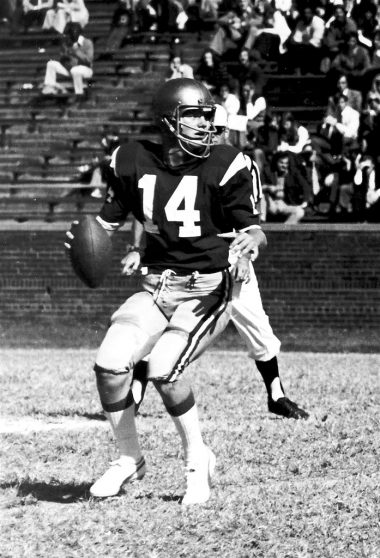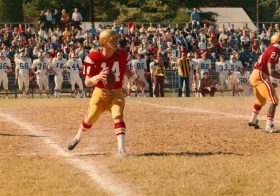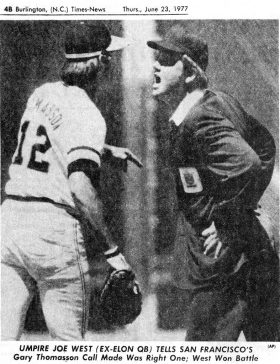To say Joe West's life has taken some interesting turns since he left Elon College in 1974 would be putting it mildly. In addition to being one of Major League Baseball's most well-known umpires of the past 30 years, West has rubbed elbows with presidents, secured a U.S. patent, even tried his hand as a country music singer/songwriter. Read on for more about West's adventures on and off the baseball diamond.
Renaissance Man

His umpiring career has spanned the terms of five MLB commissioners, and he has seen more than his share of highlights. West worked home plate when San Francisco Giants great Willie McCovey hit his 500th home run and when future hall-of-famer Greg Maddux started his first game, and he worked first base when Nolan Ryan threw his fifth of seven career no-hitters. In addition, he designed and patented the “West Vest,” the only chest protector endorsed by MLB for use by its umpires.
He’s met former presidents Bill Clinton and George W. Bush, and sung onstage at the Grand Ole Opry. West, who has recorded two country albums of his own, considers country music legend Merle Haggard a friend, and he served as a pallbearer at the 1999 funeral of singer Lecil Travis Martin, better known as “Boxcar Willie.” West even had a cameo in the Leslie Nielsen comedy, “The Naked Gun: From the Files of the Police Squad,” in 1988.
“I’ve been very lucky,” West says. “Baseball has opened a lot of doors for me that the average person wouldn’t get.”
Urban Cowboy
As West’s umpiring career took flight in the early 1980s, so did his country music career. He lived in Houston at the time and frequented Gilley’s Club, a country music bar in nearby Pasadena, Texas, featured in the John Travolta film “Urban Cowboy.” He began writing songs and sent one to Jimmy Belkin, one of Merle Haggard’s fiddle players.
“Jimmy told me to send it out, kind of as a gimmick — a baseball umpire releasing a country music CD,” West recalls.
The “gimmick” expanded to include three original songs, five covers and two instrumental pieces. The album, “Blue Cowboy,” was released in 1987. West later teamed up with Kent Goodson, country star George Jones’ pianist, on a second album. “Diamond Dreams,” released in 2008, includes monologues and songs about baseball written and performed by West. Both CDs are available on West’s Web site, www.umpirejoewest.com.

West continues to perform at various country music venues throughout the United States, primarily in the MLB offseason. In addition, he has performed with several rock musicians, including Jason Scheff, guitarist for Chicago; Jonathan Cain, songwriter and keyboardist for Journey; and Jeff “Skunk” Baxter, guitarist for the Doobie Brothers and Steely Dan.
The legend of “Cowboy Joe”
West’s music career, along with his take-charge attitude on the field, has earned him the nickname “Cowboy Joe” from many in and around MLB.
No stranger to controversy, West made headlines early in the 2009 season as crew chief during a game that featured bench-clearing brawls between the Boston Red Sox and Los Angeles Angels of Anaheim. West ejected several participants in the brawl, including Angels manager Mike Scioscia and designated hitter Bobby Abreu. West notably chose not to eject Red Sox pitcher Josh Beckett, who was accused of throwing the ball toward Abreu after Abreu called time-out, inciting the brawl. Beckett later was suspended for the incident.
“He’s one of the most intimidating umpires,” says Tim Kurkjian, a baseball reporter for ESPN. “This summer, (Tampa Bay) Rays left fielder Carl Crawford told me how, as a rookie, he used to walk to the plate with his head down and not acknowledge the catcher or the umpire. ‘You should say hello when you get to the plate, Joe West told me that,’ Crawford said. ‘After that, I always said hello to the umpire when I came to the plate. I didn’t want the umpire to be mad at me. Joe West taught me that.’”
Jack McKeon ’63, manager of five major-league teams, including the 2003 World Champion Florida Marlins, offers a similar assessment.
“Joe’s attitude got him into trouble once in a while,” McKeon says. “But one of the sharpest umpires I’ve ever run across is Joe West — he’s on top of every situation.”

Consoling the commander-in-chief
One of the perks of West’s status in his profession is the chance to interact with the rich and famous. During his career, he has met former President Clinton and both former presidents Bush. He had a close connection with the younger Bush, who served as part owner of the Texas Rangers baseball club from 1989-1998, and he knew the elder Bush was a longtime fan of another Texas ballclub — the Houston Astros.
In 2005, MLB selected West to join the crew that officiated the World Series between the Astros and the Chicago White Sox. He sent a commemorative hat and a note of condolences to the White House for President George W. Bush.
“I told him I was sorry his dad’s team made it to the Series before his team,” West laughs.
West on instant replay
One of the most controversial issues in MLB in recent years has been the implementation and possible expansion of instant replay. The calls to expand replay beyond fair/foul and fan interference calls grew louder in the 2009 postseason, when a spate of missed calls in the league division and championship series led MLB to assemble an all-veteran officiating crew for the World Series between the New York Yankees and the Philadelphia Phillies. West was selected as a member of that crew, and as president of the World Umpires Association, he is involved in some of the negotiations with MLB about instant replay. He’s not in favor of expanding replay, arguing that in many cases replay vindicates the official.
“Replay shows the umpire’s right more than 95 percent of the time,” West says. “Other sports, many have bodies flying all over the place, and in some ways they’re not as easy as baseball to call. But there’s no tougher job of officiating than working home plate in a baseball game. You’ve got to be consistent with the strike zone, to be correct from the first pitch and get better as the game goes along.”
He says with or without replay, being an umpire is often a thankless job.
“I was asked a question a long time ago by a reporter, ‘What’s your toughest call?’ My answer was, ‘Your next one,’” West says. “That’s basically how I look at it. No matter how good you are in the past, you have to be as good or better going forward.”


